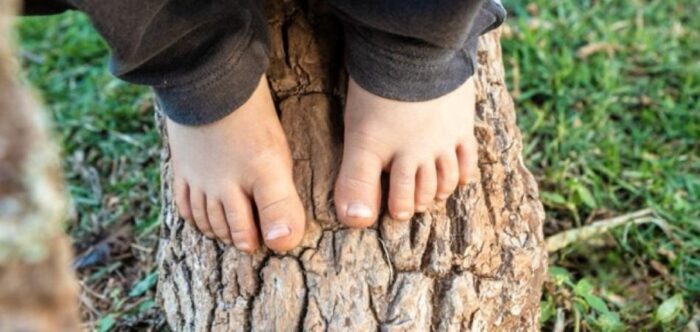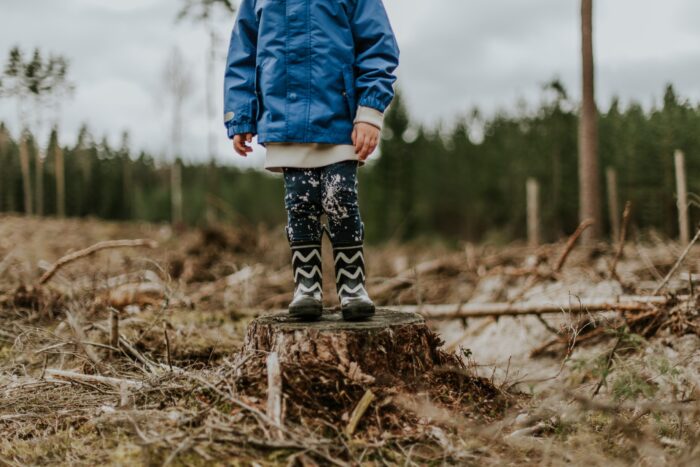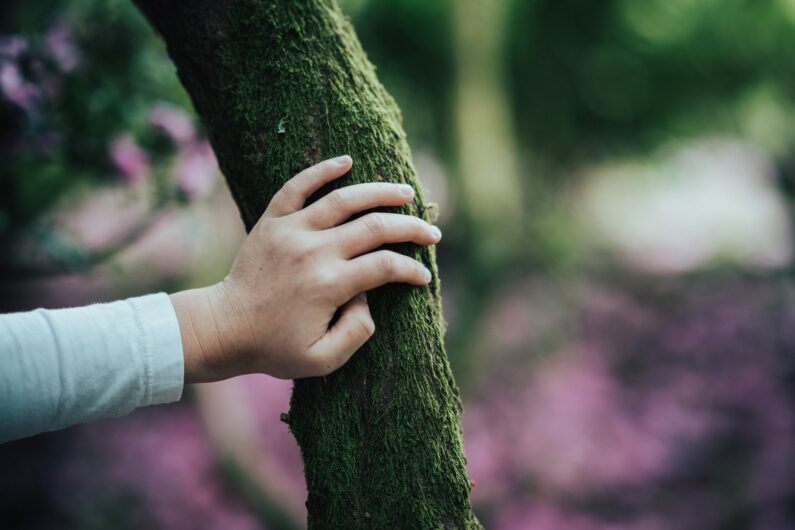You Have To Concentrate Really Hard So You Don’t Fall

Rob Lister and Lyndsay Healy share the experience of Gowrie South Australia educators and children as they collaboratively balance benefit against risk in relation to tree climbing. This article recognises and honours children as valued contributors to decisions that affect their safety and wellbeing.
Gowrie SA was fortunate to be awarded the Margaret Trembath Research Scholarship by Early Childhood Australia in October 2016 to explore the use of benefit risk assessment with children in nature-based learning.
Gowrie SA teachers were inspired by research surrounding international forest schools. The vision was to implement a bush kindergarten program for children’s learning. Challenges about implementing such a program led to research in developing an understanding of children’s capabilities to assess and manage risk in natural learning environments. There was also a need to better understand educator and family perceptions of children’s ability to assess and manage risk. Our research question became:
‘Can children aged three to six years assess and manage risk and challenge in natural learning environments within their community using a ‘benefit-risk assessment’ tool?’
The sample group of children were composed of three groups. Each group attended three different sites of increasingly natural environments.
The children had the opportunity to explore each space prior to collaborating with educators to undertake a benefit risk assessment as a group in the space. This enabled children to voice their understanding of the inherent risks of each space and how they would manage them. Parents and educators also participated in questionnaires to further support our understanding of their perceptions of children’s capacity to manage risk.
As educators analysed children’s responses, they noticed a tendency to be reflective of educator management strategies. Educators began to realise how strongly their introduction of the spaces visited influenced children’s management of risks. Educators particularly found contention in supporting children’s autonomy in risky play while fulfilling their duty of care role.
From these findings, Gowrie SA educators have become mindful of taking a balanced approach to child led and educator led risk management strategies to ensure they honour the extensive knowledge that children bring with them into the space to manage health and safety.

Since this research, a joint concern arose from families and educators about children climbing trees in the kindergarten. While this had been an experience children have participated in over many years, this year children had started testing their physical limits further than seen before. This prompted educators to reflect on the benefits of children testing their physical limits while fulfilling safety obligations. Educators decided to launch an inquiry with the children and families about children’s capacity to manage their own risk in climbing trees.
The initial stage of inquiry-based learning aims to understand the currently held knowledge of the children. To achieve this, we began informal conversations with the children who were climbing the trees. We asked them whether it is safe to climb them or not. Children shared their thoughts on the subject as they either observed others or ascended the trees themselves. Subsequently, we introduced more formal discussions through our daily group times.
WE HELD THE GROUP TIMES OUTSIDE, AROUND THE TREES, AND WE POSED FOUR QUESTIONS FROM THE BENEFIT-RISK ASSESSMENT TOOL:
-
What are the good things about climbing the trees? What could go wrong whilst climbing the trees?
-
What could we do to make sure these things do not happen?
-
Is it safe to climb the trees?
CHILDREN’S RESPONSES INCLUDED:
-
“Because it’s fun because it’s tricky to climb.”
-
“You have to concentrate really hard so that you don’t fall.”
-
“If lots of people climb the tree it won’t be safe. Maybe just two people.”
-
“If you hold onto the skinny branches they might break and you might fall.”
This line of inquiry complemented two major findings of our Margret Trembath Research. There were clear discrepancies between the knowledge that children were sharing during the group time discussions and what they were communicating to us when climbing the trees. For example, when children climbed the trees they would talk about all the things that they could see now that they had a higher view of the kindergarten.
“I like being up here because it feels like being up a giant monster and I can see the neighbour’s house.”
“It’s good to be up here because I can see all of Melaleuca (kindergarten).”
“I’m not good at climbing this tree, I’m good at climbing that tree. I will show you. See? I’m good at climbing this tree because I practiced and I got more better at climbing it. I use all my muscles because you don’t want to fall down.”
This information was not shared at all when children were asked to consider the benefits of climbing trees in the group time. Similar inconsistencies were noted when observing the risk management strategies that children were employing as they made in-the-moment decisions to ensure their personal safety.

The other complementary finding to our initial research was that the majority of knowledge shared by children during the group time discussions was very risk orientated and they tended to catastrophise the events of what might go wrong. This highlights the correlation between children being risk averse and the pervasive image in western society of children incapable of managing their own safety and therefore needing to be protected by adults.
“If you climb high in the tree and fall you could break your back”
“You might climb to the top of the tree and you might fall down. You might die”
We decided it was important to not limit ourselves to the one line of data collection when completing the benefit- risk assessment tool. We sought opportunities for educators to capture children’s voices when they were engaged in tree climbing, take photographs that documented the problem-solving strategies they were using in-the-moment, and to also provide opportunities for them document their own ideas through the arts, which consisted primarily of drawings but also allowed space for children’s re-enactments.
These additional data collection processes supported educators to gain much richer data on children’s understanding of the benefits and risks, and their management strategies. All the information was collated by the educators and presented to families in the form of a Floorbook for feedback.
Once the children’s voices had been collected and families had the opportunity to add their voice via feedback, educators then compiled the data.
The findings suggested that there was a balanced view of the benefits and the risks, and that the management strategies children either discussed or demonstrated were highly effective in reducing the risks. Educators, however, remained cautious about tree climbing.
This feeling mirrored the attitudes prevalent within the previous research project, as the educators were conflicted between allowing risky play and maintaining children’s safety. Educators saw the children as capable decision makers with an effective capacity to manage the risks they seek out, but also grappled with their duty of care to the children. These conflicting thought processes brought to question the appropriateness of this play despite the inquiry findings.
Although the tree climbing within Gowrie SA’s Underdale kindergarten had taken place for several years, the decision was made to not climb the trees, for now.
However, the perceived difficulties in talking to the children about this new rule and then following through with the limit was misplaced.
After engaging the children in the group time discussion where we revisited the benefit-risk assessment they completed and explaining that the risks outweighed the benefits, the children were disappointed but respected the judgement we had made as a group.
The result was that most children immediately ceased climbing the trees, and if a child attempted to ascend the trunk, other children would step in and remind them that this activity was no longer considered safe.
Gowrie SA’s initial small-scale research project was effective in investigating children’s abilities to identify and manage risk in natural learning environments.
Benefit risk assessments have proven to be a very useful tool to support children to identify and manage risks with their environments; however, benefit-risk assessments also have the capacity to allow children to be consulted as fellow researchers and gives them ownership over decisions about their learning.
This process of collaboration has meant that children are able to understand and act upon decisions that are made by using their benefit-risk assessment, even if this decision is contrary to their desired outcome. The educators at Gowrie SA are committed to the on-going use of benefit- risk assessments as part of their inquiry-based children’s programs for the reason that they provide multiple voices to decisions.
Acknowledgements
ROB LISTER IS AN EARLY CHILDHOOD TEACHER AND TEAM LEADER FOR GOWRIE SA – Bachelor of Early Childhood Education; Graduate Certificate of Early Childhood Leadership.
In his ten years as a teacher at Gowrie SA Rob has gained experience in developing emergent, inquiry-based programs for the kindergartens. He continues to work across the various programs at Gowrie SA to develop professional learning packages sharing his knowledge and experience within the Early Childhood sector.
LYNDSAY HEALY, DIRECTOR CHILDREN’S PROGRAM – THEBARTON – Bachelor of Early Childhood Education; Graduate Certificate of Education (Early Childhood Leadership); Certificate IV in Training and Assessment; COS-P facilitator.
Lyndsay has over 15 years’ experience working within many roles at Gowrie SA including Kindergarten Teacher, Project Officer and Director Children’s Program. She is passionate about children’s voices, advocating for high quality education and care, and supporting professional growth and reflective capacity.
This piece first appeared in Gowrie Australia’s Reflections Magazine, Issue 1, 2022. Past issues of Reflections are regularly updated and listed here.
Popular

Policy
Practice
Provider
Quality
NSW Government launches sweeping reforms to improve safety and transparency in early learning
2025-06-30 10:02:40
by Fiona Alston

Quality
Provider
Policy
Practice
WA approved provider fined $45,000 over bush excursion incident
2025-07-01 07:00:01
by Fiona Alston

Workforce
Policy
Quality
Practice
Provider
Research
ECEC must change now, our children can’t wait for another inquiry
2025-07-02 07:47:14
by Fiona Alston











